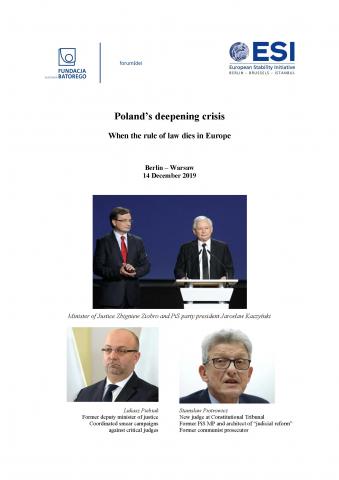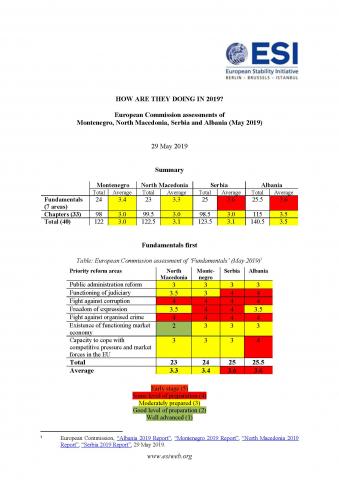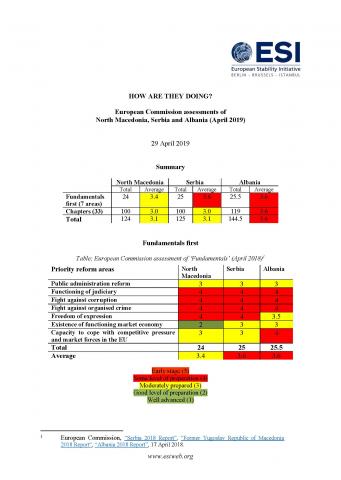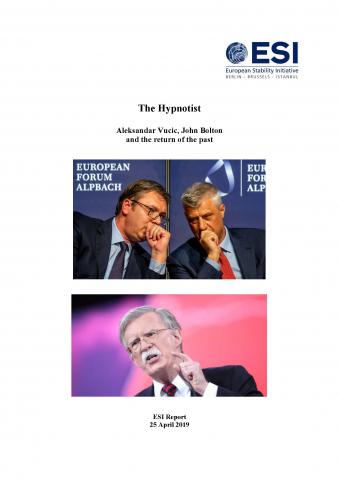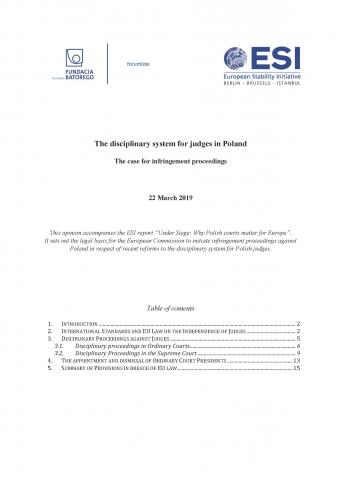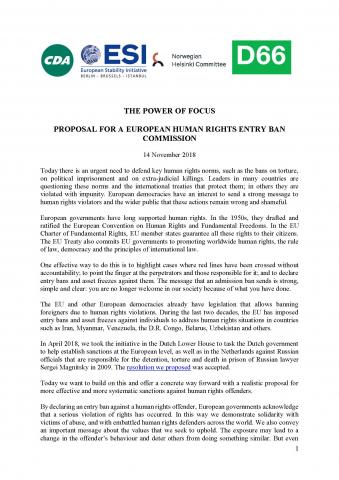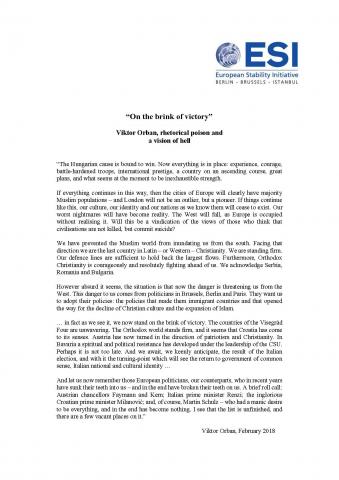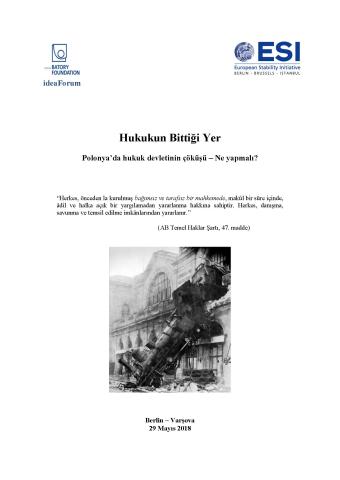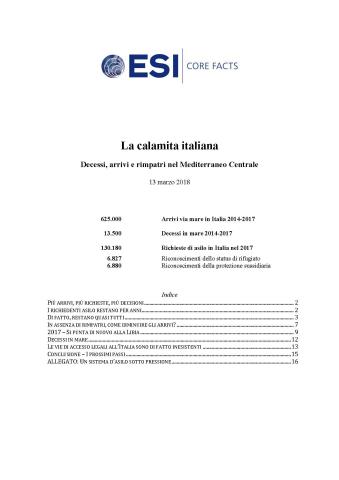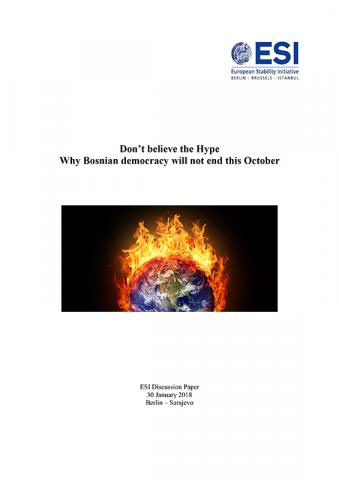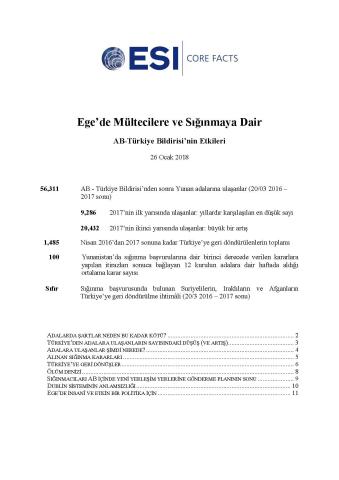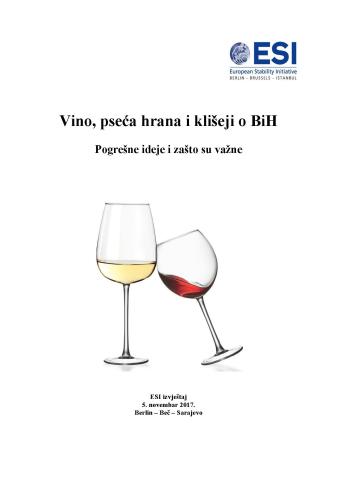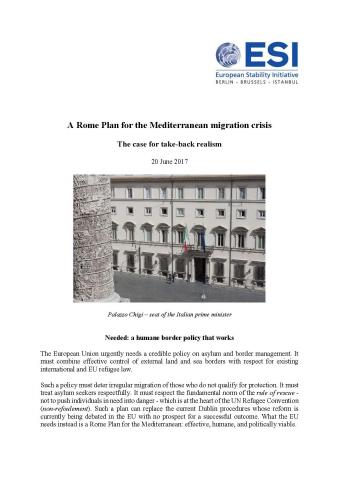Publications
155 PublicationsHow to implement the EU-Turkey Statement: Phase II – Key facts and key steps
Priorities this winter: end the humanitarian emergency on the islands; avoid a new humanitarian emergency on the mainland; reduce the number of people crossing the Balkan route; ensure that there are no push backs at any border in South East Europe.
Poland’s deepening crisis - When the rule of law dies in Europe
No member state in the history of the EU has ever gone as far in subjugating its courts to executive control as the current Polish government. The Polish case has become a test whether it is possible to create a Soviet-style justice system in an EU member state; a system where the control of courts, prosecutors and judges lies with the executive and a single party.
How are they doing? European Commission assessments of Montenegro, North Macedonia, Serbia and Albania (May 2019)
The European Commission's 2019 assessments show varied progress in Montenegro, North Macedonia, Serbia, and Albania across several areas. Fundamentally, Albania and Serbia both scored highest with 3.6, followed by Montenegro (3.4) and North Macedonia (3.3). In the 33 chapters evaluated, Albania scored highest with an average of 3.5, while the others averaged 3.0. Altogether, Albania (3.5) again led in total average score, while Serbia (3.1), North Macedonia (3.1), and Montenegro (3.0) followed.
How are they doing? European Commission assessments of North Macedonia, Serbia and Albania (April 2019)
The European Commission assessments of April 2019 indicate that Albania leads North Macedonia and Serbia in terms of reforms and meeting EU standards. For fundamentals and 33 chapters of reforms, Albania scores an average of 3.6, higher than Serbia and North Macedonia, both averaging at 3.1. Most areas in all countries are "moderately prepared," but Albania shows better capacity to cope with competitive EU market pressures and has a better functioning market economy.
The Hypnotist – Aleksandar Vucic, John Bolton and the return of the past
It is remarkable how little change there has been in the key personnel in Serbian politics since the fall of Slobodan Milosevic in 2000. It is not surprising, therefore, that the old nationalist idea of redrawing borders on the basis of ethnicity has continued to be so prominent. Why not, the siren song goes (again), adjust some borders along ethnic lines, as long as the process is negotiated peacefully and leads to reconciliation?
Core facts: The EU-Turkey Statement three years on
The EU-Turkey Statement entered into force on 20 March 2016. It led to a dramatic and immediate fall in the number of refugees and migrants arriving from Turkey by sea on Greek islands.
The disciplinary system for judges in Poland - The case for infringement proceedings
This opinion accompanies the ESI report "Under Siege: Why Polish courts matter for Europe". It sets out the legal basis for the European Commission to initiate infringement proceedings against Poland in respect of recent reforms to the disciplinary system for Polish judges.
Under Siege – Why Polish courts matter for Europe
In countries respectful of the rule of law the disciplinary system for judges is meant to uphold standards and prevent abuse. It does not do so in Poland. No other European democracy has a system like the Polish one. Nowhere else is there such a concentration of powers in the hands of one man.
The power of focus - Proposal for a European human rights entry ban commission
Today there is an urgent need to defend key human rights norms, such as the bans on torture, on political imprisonment and on extra-judicial killings. Leaders in many countries are questioning these norms and the international treaties that protect them; in others they are violated with impunity. European democracies have an interest to send a strong message to human rights violators and the wider public that these actions remain wrong and shameful.
Negotiating with a pointed gun - Sanctions, appeasement and the role of Russia in the Council of Europe
Legislators in Strasbourg will be voting on changes to PACE’s powers to sanction the parliamentary delegations of states violating human rights, democracy and the rule of law. They will also be voting on something much bigger: the relevance and credibility of the Council of Europe itself.
"On the brink of victory" - Viktor Orban, rhetorical poison and a vision of hell
In February 2018 Viktor Orban gave a carefully crafted speech on the eve of recent Hungarian elections, appealing to (West) European leaders to "reverse" the presence of Muslims in their cities. No wonder that the first to congratulate Orban following his election victory in April were Europe's racist and far-right parties.
Where the law ends. The collapse of the rule of law in Poland – and what to do
No member state of the EU has ever gone as far in subjugating its courts to executive control as the current Polish government has done. The Polish case is a test whether it is possible to create a Soviet-style justice system, where the control of courts, prosecutors and judges lies with the executive and a single party, in an EU member state.
The Italian Magnet - Deaths, arrivals and returns in the Central Mediterranean
The EU, and Italy especially, remains a magnet, as almost nobody who arrives is ever returned, regardless of the decisions of asylum bodies. The political debate returns like a pendulum to earlier experiences of agreements with North African states (Tunisia and Libya) as the only way to stop boats arriving.
Don't believe the Hype – Why Bosnian democracy will not end this October
Bosnian democracy is safe. This should have been obvious all along. But then again, many obvious things have often been obscured when it comes to the work of Bosnian institutions. On this, as one previous occasions, the rational approach is the same: don't believe the hype. Bosnian democracy will not end in October.
Refugees and asylum in the Aegean - The impact of the EU-Turkey statement
The challenge for Greek and EU policy makers is clear: to ensure humane reception conditions in line with EU standards for every asylum seeker and migrant who arrives on the islands. If the average time people spend on the islands were 2 months only, and arrivals were below 3,000 a month, the accommodation capacity needed on all islands would be 6,000.
"Amsterdam in the Mediterranean" – How a Dutch-style asylum system can help resolve the Mediterranean refugee crisis
Leaders across the EU are looking for a fast, effective and humane asylum system; a system which determines quickly, but thoroughly, who needs protection; creates disincentives for people to get into boats; and manages to return those who are found not to need protection within a short period of time.
Wine, dog food and Bosnian clichés – False ideas and why they matter
Bosnian leaders need to make the system they have work better. This requires setting aside the main clichés discussed here: that in Bosnia ethnic and religious hate has been growing for years; that politics is rotten; and that the constitution poses an insurmountable obstacle to any progress.
A Rome Plan for the Mediterranean migration crisis – The case for take-back realism
The European Union urgently needs a credible policy on asylum and border management. It must combine effective control of external land and sea borders with respect for existing international and EU refugee law.
"Hang them in Taksim" – Europe, Turkey and the future of the death penalty
For Turkey to reintroduce the death penalty – the last execution took place in 1984 – would constitute a serious setback in the global struggle against capital punishment. Europeans should take the threat of the return of capital punishment in Turkey seriously. The EU and the Council of Europe should take every step they can, in time, to make this as unlikely as possible – in Turkey and anywhere else in Europe.
The Chapter Illusion – For honesty and clarity in EU-Turkey relations
Both Turkey and the EU need to find a framework where sensitive issues can be discussed fruitfully. A reformed accession process provides such a framework. The key to such a process is clarity: it needs to be clear what EU standards are, how far Turkey is from meeting them and why it is useful for both sides to remain engaged in a dialogue on this. The EU needs a policy that is understood before it can have one that might be transformative.


